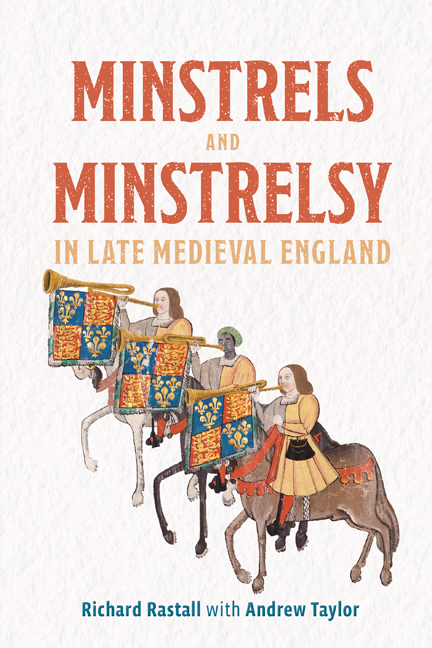Book contents
- Frontmatter
- Dedication
- Contents
- List of illustrations
- List of music examples
- List of abbreviations
- A note on references
- A note on money
- A note on dates
- Preface
- Acknowledgments
- Part I Minstrels and Minstrelsy in the Elite Households
- Part II Urban Minstrelsy
- Part III On the Road
- Part IV Minstrel Performance
- Envoi
- Bibliography
- Index
Envoi
Published online by Cambridge University Press: 09 January 2024
- Frontmatter
- Dedication
- Contents
- List of illustrations
- List of music examples
- List of abbreviations
- A note on references
- A note on money
- A note on dates
- Preface
- Acknowledgments
- Part I Minstrels and Minstrelsy in the Elite Households
- Part II Urban Minstrelsy
- Part III On the Road
- Part IV Minstrel Performance
- Envoi
- Bibliography
- Index
Summary
Studying the day-to-day activity of the minstrels, and thereby broadening the focus of enquiry outwards from special occasions into a wider field of study, offers no startling break-through but does help to increase our understanding. The current picture of minstrelsy and its place in late medieval English society is both broader and more detailed as a result.
Refocussing the picture allows a fuller understanding of the range of careers that minstrels followed. This includes the circumstances of their employment by magnates, towns and institutions, revealing the relatively stable and remunerative patterns of employment that were open to them, which of these they chose (when the choice was available) and which were imposed on them. The accumulation of dayto- day information, too, adds to our knowledge of individual lives, careers and even life-style, and sheds light on employment mobility, both within limited local areas and internationally. Among the careers illuminated are those of several interesting individuals, such as the trumpeter and herald-king Robert Little and the trumpeter and fixer Thomas Chatterton.
It may also now be easier to see vocal and instrumental minstrelsy as parts of a single activity, if our work has fully dispelled the old romantic myths and replaced them by the historical facts of employment. Minstrelsy – all secular music – was no casual or occasional amusement: it was part of the under-lying structure of daily existence, fully integrated into the activities of all societies, from the established ceremonials of the king's household to the civic events normally available to dwellers in the most poverty-stricken urban slums.
Considering our ultimate reason for studying medieval minstrelsy, we have aimed for a better basic appreciation of how minstrels performed. One can never have all the information needed (that is so for the modern performance of any musical or dramatic work from a previous period) and so can never accurately reconstruct a medieval performance: but the more we know, the more we can understand both the work itself and those who performed and witnessed it. The problem is to uncover the relationship between written texts and notated music on the one hand and performance on the other.
- Type
- Chapter
- Information
- Minstrels and Minstrelsy in Late Medieval England , pp. 395 - 398Publisher: Boydell & BrewerPrint publication year: 2023



